Acticles
03.11.2021
ECML National Language for Work in Ireland: developing practical approaches to supporting sustainable and effective supports for developing workplace language skills of adult migrants in Ireland
Local organisers of this ECML training and consultancy event: Dr Deirdre Ni Loingsigh (University of Limerick (UL)) , Dr Catherine Martin (UL), Ciara Considine (UL) and Tara Robinson (Limerick & Clare Education Training Board)
This was the first ECML funded Language for Work National Training and Consultancy event to take place in Ireland. The event was designed to support development of work-related language skills crucial to the integration and participation of second language (L2) adult migrants and ethnic minorities in Irish workplace settings. A broad range of stakeholders attended the event and shared ideas about developing and supporting language for work provision for L2 learners in Ireland. The ECML moderators of the event offered participants practical guidance for helping teachers, providers, employers, policymakers, and others involved in supporting work-related L2 learning of adult migrants and ethnic minorities across the country. The event facilitated the creation of useful networks amongst key stakeholders in Ireland and there are plans to begin implementation of some of the LfW models presented at the event.
This event provided a significant opportunity for staff from further and higher education to come together around an area of interest - that of Language for Work. The success of the event shows that there is exciting potential for collaborative work in the future which will be of benefit to all. The event energised stakeholders and provided tangibles examples of effective practice from other countries which can be implemented in Ireland. The importance of this training and consultancy was highlighted by the Vice-president of the University of Limerick, Professor Máiréad Moriarty also, who noted that “in bringing together a broad range of stakeholders to network and share ideas about language for work for L2 learners in Ireland, this event is addressing an urgent linguistic, cultural and economic need of Ireland”.
Contact details: LanguageForWork@ul.ie
****
Irish language press release (October 2021)
Scileanna Teanga don Ionad Oibre: Ag Tacú le Foghlaim an Dara Teanga ag an Obair
Ar an 30 Meán Fómhair agus an 1 Deireadh Fómhair 2021, bhí ócáid Scileanna Teanga don Ionad Oibre (LfW): Ag Tacú le Foghlaim an Dara Teanga ag an Obair (T2) in Éirinn ar siúl den chéad uair in Éirinn. Tacaíonn an tionscadal Scileanna Teanga don Ionad Oibre (LfW) atá maoinithe ag an Lárionad Eorpach um Nuatheangacha (ECML) le forbairt scileanna teanga ag an obair, rud atá ríthábhachtach do chomhtháthú agus do rannpháirtíocht imirceach fásta dara teanga (T2) agus mionlaigh eitneacha san ionad oibre. Bhí sé mar aidhm leis an ócáid náisiúnta LfW seo raon leathan lucht leasa a thabhairt le chéile chun plé a dhéanamh agus smaointe a roinnt maidir le forbairt agus tacú le scileanna teanga don ionad oibre a chur ar fáil d’fhoghlaimeoirí T2 in Éirinn. Tugadh treoir phraiticiúil do mhúinteoirí, do lucht déanta polasaithe agus do dhreamanna eile a bhfuil baint acu le tacú le foghlaim T2 ag an obair d’imircigh fásta agus do mhionlaigh eitneacha ar fud na tíre ag an ócáid.
Ba iad comhordaitheoirí na hócáide náisiúnta seo an Dr Deirdre Ní Loingsigh, Scoil an Bhéarla, na Gaeilge agus na Cumarsáide, an Dr Catherine Martin, Scoil na Nuatheangacha agus na Teangeolaíochta Feidhmí, Ciara Considine, Aonad na Gaeilge, Ollscoil Luimnigh agus Tara Robinson, Bord Oideachais & Oiliúna Luimnigh & an Chláir.
Ag labhairt di faoi thábhacht na hócáide, dúirt an tOllamh Máiréad Moriarty, Leas-Uachtarán OL don Rannpháirtíocht Dhomhanda agus Pobail, go bhfuil an tionscadal seo ag tabhairt aghaidh ar riachtanas práinneach teanga, cultúrtha agus eacnamaíoch na hÉireann trí raon leathan 70+ lucht leasa a thabhairt le chéile chun smaointe a phlé agus a roinnt faoi scileanna teanga don ionad oibre d’fhoghlaimeoirí T2 in Éirinn. Is deis é seo scileanna teanga na n-imirceach fásta in Éirinn a fhorbairt don ionad oibre, agus ag an am céanna, scileanna ilteangacha na ndaoine a ghlacann páirt sa tionscadal a cheiliúradh.
D’oscail Maria Lorigan Cigire Sinsearach sa Roinn Oideachais agus ionadaí na hÉireann ar Bhord Gobharnóirí an Lárionaid Eorpaigh um Nuatheangacha, an ócáid go hoifigiúil, agus dúirt an Dr Angela Farrell, Déan Cúnta, Idirnáisiúnta, OL, agus léachtóir in TESOL agus Teangeolaíocht Fheidhmeach, Ollsoil Luimnigh cúpla focal fáilte agus tacaíochta.
Bhí tairiscint na hÉireann ar cheann de líon beag iarratas rathúil ó bhallstáit ar fud na hEorpa chun oiliúint agus comhairleoireacht a reáchtáil sa cheantar. Ba iad áisitheoirí agus saineolaithe an Lárionaid sa réimse Matilde Grünhage-Monetti (DE); Alexander Braddell (RA), agus Kerstin Sjösvärd (SE). Roinn siad samplaí d’idirghabhálacha agus de thionscadail rathúla atá deartha chun tacú le foghlaim teangacha don ionad oibre i gcomhthéacsanna éagsúla ar fud na hEorpa.
Ar an gclár oibre bhí cur i láthair ar an tionscadal 'Eolas ar mhaithe le hAthrú' (K4C) i Luimneach, tionscnamh de chuid Chathaoir UNESCO le Taighde Pobalbhunaithe agus Freagracht Shóisialta san Ardoideachas chomh maith. Tá ríméad ar OL agus ar Bhord Oideachais & Oiliúna Luimnigh & an Chláir tacú le comhpháirtíochtaí nua maidir le Foghlaim Dara Teanga ag an Obair in Éirinn ag leibhéal áitiúil, náisiúnta agus Eorpach.
Sonraí teagmhála:
LanguageForWork@ul.ie
29.10.2020
“Language for work – Tools for professional development”: new resource website for all practitioners supporting work-related second language development for migrants and ethnic minorities


- Are you an L2 teacher in adult education, a vocational teacher, a researcher, an educational provider and are you interested in the linguistic integration of adult migrants, investigating language requirements of workplaces and needs of the parties involved, curricula implementation, exploiting the L2 resources of the working environment, work-related language provision and/or support, promoting the issue with labour market actors?
- Are you a teacher trainer looking to develop knowledge and skills regarding practical ways to support work-related L2 learning?
- Are you a teacher, a volunteer, a co-worker, an employer, a civil servant responsible for integration programmes interested in non-formal and informal learning arrangements on the jobs (types of support, necessary skills and structures)?
- Are you a labour market actor (employer, HR manager, etc.) who needs to learn more about L2 issues in the context of work, enablers of and barriers to work-related L2 learning, workforce or workplace development?
- Are you a decision maker (social partner, educational decision makers, policy maker …) looking for inspiring examples to develop a vision, strategic initiatives, including policy and specific local initiatives in the field?
- Would you like to share and develop research and practice, collaborate on projects, shape policy, and enable more effective local responses, create innovation?
If so, you’ll be pleased to know that the European Centre for Modern Languages (ECML) of the Council of Europe has just launched its resource website “Language for work – Tools for professional development” (https://languageforwork.ecml.at), an output of the ECML programme “Languages at the heart of learning” (2016-2019), in both English and French.
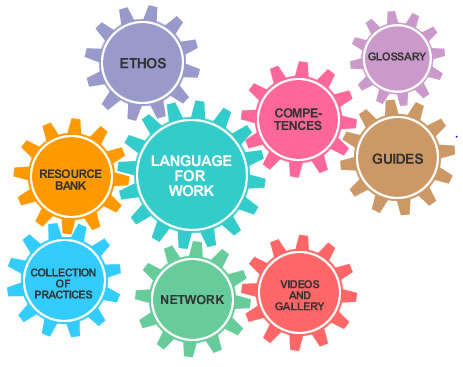
Language for Work adopts a coherent approach to work-related second language development with special attention to the integration of migrants, refugees and ethnic minorities. The website provides professionals working in this field with a dynamic platform for sharing expertise and developing practice as well as a comprehensive set of resources including research and policy material, descriptions of competences for those supporting work-related language learning, quick guides, and examples of practice. These resources will help overcome the challenges of integrating migrants and refugees in the workplace, challenges exacerbated by the current pandemic.

23.03.2020
New ECML publication: Communicating with migrants - Guide for staff in job centres and public services
Communication is key to the effective delivery of public services, but it can be challenging for many reasons. Where clients have limited spoken and/or written skills in the majority language and different cultural perspectives, these challenges are all intensified.
Fortunately, there are concrete things you can do to address these challenges. This leaflet offers strategies and practical tips for managers to help staff support clients with limited language skills. And it offers help for all staff to reflect on communication styles used in today’s increasingly culturally and linguistically diverse working context.
The guide is available in the following languages: български - English - Español - Français - Gaeilge - Nederlands - Norsk - Pусский - Svenska
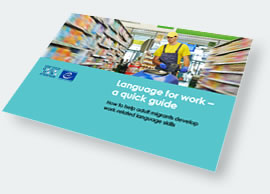
31.05.2019
Language for Work project receives the European Language Label award
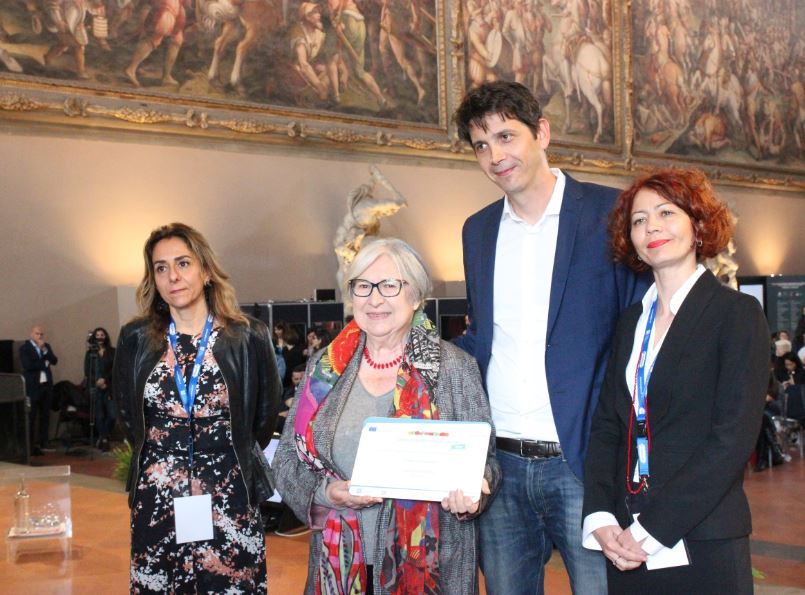 The magnificent the Salone dei Cinquecento served as backdrop for the award of the 2018 Italian European Language Label in the Palazzo Vecchio, Florence. On behalf of the Language for Work project, the coordinator, Matilde Grünhage Monetti, received the prize for the book Lingua e lavoro, a cooperation between the Italian publishers Loescher and LaLinea and the ECML.
The magnificent the Salone dei Cinquecento served as backdrop for the award of the 2018 Italian European Language Label in the Palazzo Vecchio, Florence. On behalf of the Language for Work project, the coordinator, Matilde Grünhage Monetti, received the prize for the book Lingua e lavoro, a cooperation between the Italian publishers Loescher and LaLinea and the ECML.
The most imposing chamber − 52 m x 23 m − built in a single year in 1494 as a seat of the Grand Council (Consiglio Maggiore), hosted the conference “United in Diversity” and the award ceremony within the Festival d’Europa in Florence from 1 to 10 May 2019. (Programme)
Organised by the Italian and French ERASMUS+ National Agencies (INDIRE, INAPP e ANG and the Agence Erasmus+ Education et Formation), the conference, involving over 100 international guests, highlighted the contribution of the Erasmus+ programme towards building a European identity and a sense of belonging to Europe.
The award ceremony called on stage 18 international initiatives that had distinguished themselves for innovative proposals in teaching and learning of languages from primary education to adult and continuing education and VET, in all the countries of the European Union.
The label is awarded annually or biannually in each country participating in the scheme. By supporting such initiatives, at local and national level, the label aims to raise the standard of language teaching across Europe and promote good practice.
The day before the award, the winners had the opportunity to present their projects in the Erasmus+ pavillion in the Piazza della Repubblica. Andrea Ghezzi, from LaLinea, presented the book and Matilde Grünhage-Monetti, one of the editors together with Alexander Braddell, was asked to briefly highlight the issue of work-related second language (L2) development for migrants.
The Lingua e lavoro publication brings together 13 examples of work-related L2 practices across Europe for adult migrants. It focuses on formal, non-formal and informal L2 learning arrangements aimed at improving L2 skills for work, at work and through work. Most of the authors are members of the Language for Work network, created through the two ECML projects “Developing migrants’ language competences at work (2012-2015) and "Language for Work 2: Tools for professional development" (2016-2018), and the two editors are part of the coordinating team of the projects.
Although Italian language courses for adult migrants are widespread, language development focuses mainly on formal education and integration. There is no language support once migrants have found employment. The consequence is that the most vulnerable ones with limited educational capital remain stuck in the so called “low-pay, low-skill-language” trap.
The practices described in the volume show a large spectrum of possible initiatives, through “traditional” qualification courses, or directly on the job, by involving colleagues and supervisors as mentors, or supporting self-directed learning through coaching. They are not intended to serve as blueprints to be transferred automatically to other contexts. However, as a source of inspiration, they can trigger innovative local solutions.
The possibility to expand on the issue, even if briefly, has contributed to raise the awareness of the need to offer support for work-related L2 development among an audience sensitive to language issues, although the majority is involved to a greater extent with formal education. Positive feedback from the audience, among others the representative of Italian Epale, and Rossano Arenare from the agency Inapp, who chaired the presentation of the VET section, demonstrated that the message was understood and well received.
Matilde Grünhage-Monetti
28.05.2019
“Language for Work – Tools for professional development” (2016-2018): achievements
The end of 2018 brought to a close the second Language for Work project, “Language for Work – Tools for professional development” (2016-2018). It is therefore time to present its achievements.
Both the current project and its immediate predecessor, “Language for Work – Developing migrants’ language competences at work” (2012-2015), addressed not only “traditional” language professionals such as teachers, educational providers and policy makers, but also labour market actors, including employers, managers, co-workers, job centre staff and volunteers supporting work-related L2 development by migrants and ethnic minorities.
The results of the two Language for Work (LfW) projects are documented by the LfW website (http://languageforwork.ecml.at), including a comprehensive set of resources, describing both competences and diverse examples of actual practice.
At the same time, this website is a platform for an active network, where teachers, providers, researchers, employers and authorities can share expertise and develop practice. The LfW Network currently counts over 200 registered members: 182 individual members and 34 organisational members. These members are drawn from a total of 37 countries, mostly in Europe, but also further afield, including New Zealand, Canada, USA, Mexico, Brazil and South Korea. This network will continue beyond the lifetime of the two projects, thanks to the willingness of the project team to continue to administer the network, and the ECML to maintain the website.
The LfW outputs
The LfW resource centre currently contains 218 items contributed by the network members and the coordinating team. It includes research papers and practical resources in the original language(s) with a short introduction in English. This plurilingual platform gives evidence of the added value of Europe’s linguistic and educational diversity.
In addition to these items, the resource centre also includes the outputs of the closing project, which have been developed by the coordinating team in consultation with the network members:
- Quick guide: how to help adult migrants develop work-related language skills
- Collection of practices
- Checklist of competences for different actors useful to support work-related L2 development
- Communicating with migrants: Guide for staff in job centres and public services
The Quick Guide was commissioned by the project sponsors in response to the influx of refugees in 2015. It is aimed at professionals working in different areas, including language learning by adult migrants, integration programmes, vocational education and training, adult/continuing education, human resources and labour market support services. Its content is articulated in short chapters on key issues or work-related L2, which are further illustrated by brief case studies from different industry sectors from all over Europe. The guide gives an overview of different ways how to develop them, focusing on barriers to and enablers of language learning. It investigates then more closely ways to support learning outside the classroom, exploiting the L2 resources available in the workplace and the structural opportunities of work. It closes with practical tips how to support L2 learning at and through work.
Originally written in English, the Quick Guide has since been translated into a further 14 languages by network members. Printed editions have been produced in English, German, Italian, and soon in French. Wherever it has been presented, at conferences and other events, the Quick Guide has earned great success. Interest in the Quick Guide gives evidence of the urgency of the issue and the need for tools to promote non-formal and informal (language) learning.
The Collection of practices is a description of 35 practices from Europe and Canada that documents different ways to support work-related L2 learning through formal, non-formal and informal learning, identifying the various learning contexts and the key actors involved. The descriptive categories capture the main features of the practice, such as the type of support it offers, for whom, how, and where. Although not representative, the collection gives an overview of the wide spectrum of L2 approaches: from innovative provision in “traditional” contexts such as vocational schools to completely new arrangements in companies, integrating formal, non-formal and informal learning. Finally, it offers data to identify competences helpful to the key actors to put in place effective support in the different learning contexts/settings.
This collection is “work in progress”. The LfW team is aware that there are practices which have not been recorded yet, which may need new descriptions. A great challenge for education and training is posed by new forms of work organisation and freelancer employment models which are taking hold. Although this phenomenon concerns “natives” as well, migrants are overrepresented in the so-called “gig” economy, often working in isolation, such as women working as domestic helps or carers for the elderly in the homes of the employers, with or without contracts.
The Checklist of competences for different supporters in different settings attempts to describe competences helpful to the key supporters of L2 development for, at and through work. This is a field at the crossroads of different social systems, including education, work, public administration, etc. Each has its own aims and goals, priorities, power relations, logics, dynamics. To support L2 development the various actors involved require different competences.
The project’s checklist of competences draws on the collected practice examples, as well as the expertise of LfW Network members as teachers, teacher-trainers and researchers.
The competences are presented by supporter, in a range of “settings” where opportunities exist for different combinations of actors to support work-related L2 learning. The following example shows the specific skills of teachers, supporting L2 directly at work.
The teacher is
- familiar with ethnographic methods and instruments to identify the language and communication needs of learners and employers;
- willing to raise awareness of workplace actors for the role of language as part of vocational competence;
- able to develop a realistic curriculum on the basis of the needs analysis, language level of the learners and structural conditions (e.g. time).
Consistent with the idea that effective communication is a joint venture, Communicating with migrants: Guide for staff in job centres and public services or The other side of the coin, offers guidance to staff in labour market administration and public services.
Communicating with an increasingly diverse clientele − culturally and linguistically − is becoming more challenging for public administrators. This short guide helps staff make communication more accessible for all clients and shows managers how to support own staff in this endeavour.
The brochure was originally developed in German at request of public administrators. The English version is online, and the French is in preparation.
This guide concludes the LfW work. Like the other outputs, it is inspired by the values of the Council of Europe and the ECML of providing support for quality language development as key for all learning for all people living in Europe.
Looking back, looking ahead
The numerous invitations to contribute to conferences and publications show that the expertise of LfW is recognised by the international community. An official sign of recognition from the EU for the importance of the issue and the quality of the LfW work is the European Language Label 2018 awarded by Italy for the book, Lingua e lavoro. Published by the Italian publishers Loescher and LaLinea in cooperation with the ECML, the volume was edited and mainly written by LfW members.
Although the programme has come to an end, there is still much to do. The linguistic integration of adult migrants will remain of vital importance for Europe societies for the future and we coordinating team and network members are committed to this issue.
The project team: Matilde Grünhage-Monetti (coordinator, Germany),
Alexander Braddell (United Kingdom), Christophe Portefin (France), Kerstin Sjösvärd (Sweden)
12.02.2018
Intense and fruitful exchange of ideas on future developments in language education
The 2-day meeting (6-7 February 2018) at the ECML in Graz, Austria, was an excellent opportunity for the ECML project experts to discuss ongoing project developments with their fellow project coordinators.
They explored synergies between the different projects and exchanged good practice in project methodology. They discussed ongoing work on the development of their products and how to best disseminate the wide range of final results which will be achieved by the end of 2018 and 2019. They reflected on critical success factors to promote the achievements across and at the end of their respective project life cycles, to implement, to mediate, to possibly further develop them and to maximise impact in the various national and individual contexts. Finally they shared initial ideas for both the contents and the structure of the next ECML programme (2020-2023). They also highlighted the added value, both professional and personal, of coordinating ECML projects, seeing this as an opportunity to bridge policy, research and practice and contribute to making a real difference to quality language education in Europe.
Impressions of the meeting (photo gallery on Facebook)
Current ECML programme of activities 2016-2019: "Languages at the heart of learning"
12.01.2018
Language for Work – Tools for professional development: Looking back, looking forward
The coordinating team of the project, Language for work – Tools for professional development (LfW) held its expert meeting in Graz on 7th and 8th December 2017. With it the team closed a very busy and eventful year and prepared the floor for the activities of the project’s final year.
A printed exemplar of the Language for Work – a quick guide. How to help adult migrants develop work-related development of language skills welcomed the team at ECML. Members and interested persons will find the English version on the project’s website. Versions in French and German will be soon online. Versions in further languages have been arranged. Members are invited to translate the Quick Guide into ‘their’ languages and disseminate it. If you can support the dissemination of this practical tool for professionals to support the linguistic integration of migrants, please contact the team at lfwnetwork@ecml.at for a template and any support needed. In addition to the Quick Guide, two other sets of guidelines for, respectively, decision-makers and staff in public services (including labour market administration) are ready in German. They aim at supporting social services to lower barriers when communicating with migrants. An English version as basis for further translations will be ready at the beginning of 2018. Interested members are welcome to translate and disseminate these guidelines as well.
In 2017 the team has been involved in a series of events to progress and disseminate the project and Network. The central event was the network meeting held in Graz on 1st and 2nd June. This attracted 26 experts from 16 countries including Canada and the Russian Federation (Moscow State Linguistic University). The participants provided examples of practice for the compendium of ways to support the development of work-related L2 skills, advised the team in central issues such as how to structure the tools for professional development. The team was also invited to various national and internationals events to present the LfW project and network: e. g. symposia such the UN Language, the Sustainable Development Goals, and Vulnerable Populations, New York, and the meeting on integration for the Intergovernmental Consultations on Migration, Asylum and Refugees, of the agency the International Organisation for Migration (IOM) in Geneva, both in May; and The Changing Context of Migration and LESLLA , in Portland Oregon, in August. Such prominent invitations as well as the numerous publications give evidence that work-related second language development is an increasingly recognised field and the network with it.
The project’s main event next year will be the final workshop in Graz on 23rd and 24th October 2018, where the team will present the following tools to advance practitioners’ professional development
- A quick guide, How to help adult migrants develop work-related language skills
- Guidelines for decision-makers and staff in public services to facilitate communication with migrant clients
- Ways to support work-related language development, including a compendium of practice examples
- Overview of practitioner competences indicated for different types of support
- Language for Work Network resource centre
This workshop will offer networking opportunities with experts (including teacher trainers working in the fields of adult second language learning and vocational education and training; researchers with an interest in work-related language development; national skills policy makers; workforce development professionals; employer and trade union representatives). Participants to this event are selected by the national agencies, so colleagues interested in attending should contact their national agency. If you want information about how to do this, please contact the project team at lfwnetwork@ecml.at
Between now and October 2018 a busy time awaits the LfW team, to finalise the project’s products.
In the meantime we wish you a peaceful Christmas and a Good New year with this picture of Graz in advent.
Quick Guide
Language for Work Network website
17.07.2017
News from Language for Work (LfW): Quick guide: How to help adult migrants develop work-related language skills – COMBI Multipliers’ event
by Matilde Grünhage Monetti, coordinator of Language for Work (LfW) (http://languageforwork.ecml.at)
At initiative of Petra Elser, LfW-Network member, I was invited to participate in a multiplier event for the COMBI project in Donostia, in the Basque region of Spain, on 6th and 7th June.
The project Communication competences for migrants and disadvantaged background learners in bilingual work environments is co-funded by the Erasmus+ Programme of the European Union. COMBI partners are acting in various officially bilingual regions in Europe. The once dominant languages of these regions have been minoritised through the hegemonic language policy of the nation-states – I prefer to speak of “minoritised” languages and not “minority” languages. In this sense the COMBI languages (Basque, Welsh, Frisian, Swedish in parts of Finland and the Sicilian dialects) are representative of many more in Europe.
The issue of these minoritised languages is particularly relevant in today’s context of migration, demographic change and the shortage of local staff in health and social care. Health and social care sectors across Europe have become heavily dependent on migrant staff. In bilingual regions these migrant workers face the double challenge of having to learn to at least a certain degree of proficiency both languages of the host country. It is to be expected that the older people they care for, in particular people with dementia, may react better to the language of their childhood: Basque, Welsh, dialect, etc., while other interlocutors and the environment in general may speak predominantly the “national” language.
The COMBI project therefore wants to provide vocational teachers in the health care sector and minority language teachers with innovative tools aiming at developing the language skills in the minority language migrants need for working in the health care sector (www.combiproject.eu).
For the event in Donostia I chose to present the Quick guide, since it encourages reflection on the essentials of L2 learning and offers advice and practical tips, how to support migrants develop work-related language skills. Each statement was illustrated with mini case-studies provided by Network members from all over Europe (http://languageforwork.ecml.at/Portals).
The meeting was held in Basque and in the project language, English. From the partners’ contributions emerged the different status of the minoritised language in the various countries due to historical developments. In the fields of policies next to the very functional approach of Finland with its focus on individuals as workforce, the Basque provider KABIA brought humanistic dimensions into the discussion talking about principles of care, linguistic equality, responsibility and social justice.
In the discussions the same issue emerged which was discussed at the Network Meeting in Graz (1st and 2nd June): language and communication as shared responsibility of all actors involved. To echo the title of a manual produced by the Swedish colleagues of ArbetSam: Better language means better care and therefore higher quality, which is an asset for the whole society (http://www.aldrecentrum.se/......pdf).
Another common theme was the shift of focus from teaching to learning and a growing interest for non-formal and informal arrangements, equally discussed in Graz. Another commonality is the growing interest for reflective and affective dimensions of learning. Particularly effective were the practical examples by other guest speakers: Cathrin Thomas, Arbeiterwohlfahrt, Bielfeld, Germany, presented some of her phonetic exercises and two French-Basque colleagues, Etcharry Formation Dévelopment, Ustaritz, illustrated their holistic training approach. Finally the concept of translanguaging was vividly illustrated by the practical examples of the methodology used by Banaiz Bagara Elkartea in their Basque language courses, which is particularly effective in bilingual situations. The aim is not to train two monolinguals in one person, but language users who can draw on their entire linguistic repertoire: The languages in question are not treated as separate entities; the transition from one to the other is fluid.
A remarkable sociological insight on the employment rate of migrants in the Basque countries was presented at the conference: The number of women in work is higher than the number of men. Most of these women come from South America and work as domestic help in private households without social insurance.
The event itself was a good example of translanguaging with fluid transition between Basque, English, Castillian, and many more European languages!
I would like to close with an homage to the great Sicilian poet, Ignazio Buttitta (1899-1997), who has often written on the loss of his native “minoritized” language:
e sugnu povirucellule
haiu i dinari
e non li pozzu spènniri,
i giuielli
e non li pozzu rigalari;
u cantu,
nta gaggia
cu l'ali tagghati
|
and I am poor
I have money
but I cannot spend it,
jewels
and I cannot make presents of them;
(my) song
in the throat
with wings clipped.
|
*****
Download this news in PDF version: English - French
06.02.2019
"Language for Work - Tools for professional development" : results of the final coordination meeting (Graz, Austria, 23-24 January 2019)
The final coordination meeting of the project "Language for Work - Tools for professional development" (LfW) was held in Graz, on 23-24 January 2019. At this meeting, the project team discussed and agreed the following points:
-
Final design of the website developed over the course of the two LfW projects, presenting the outcomes of the two projects, namely:
- The LfW network pages
- Collection of practice examples
- Checklist of competences
- Quick Guide, and other guides
- Resource bank
- Videos
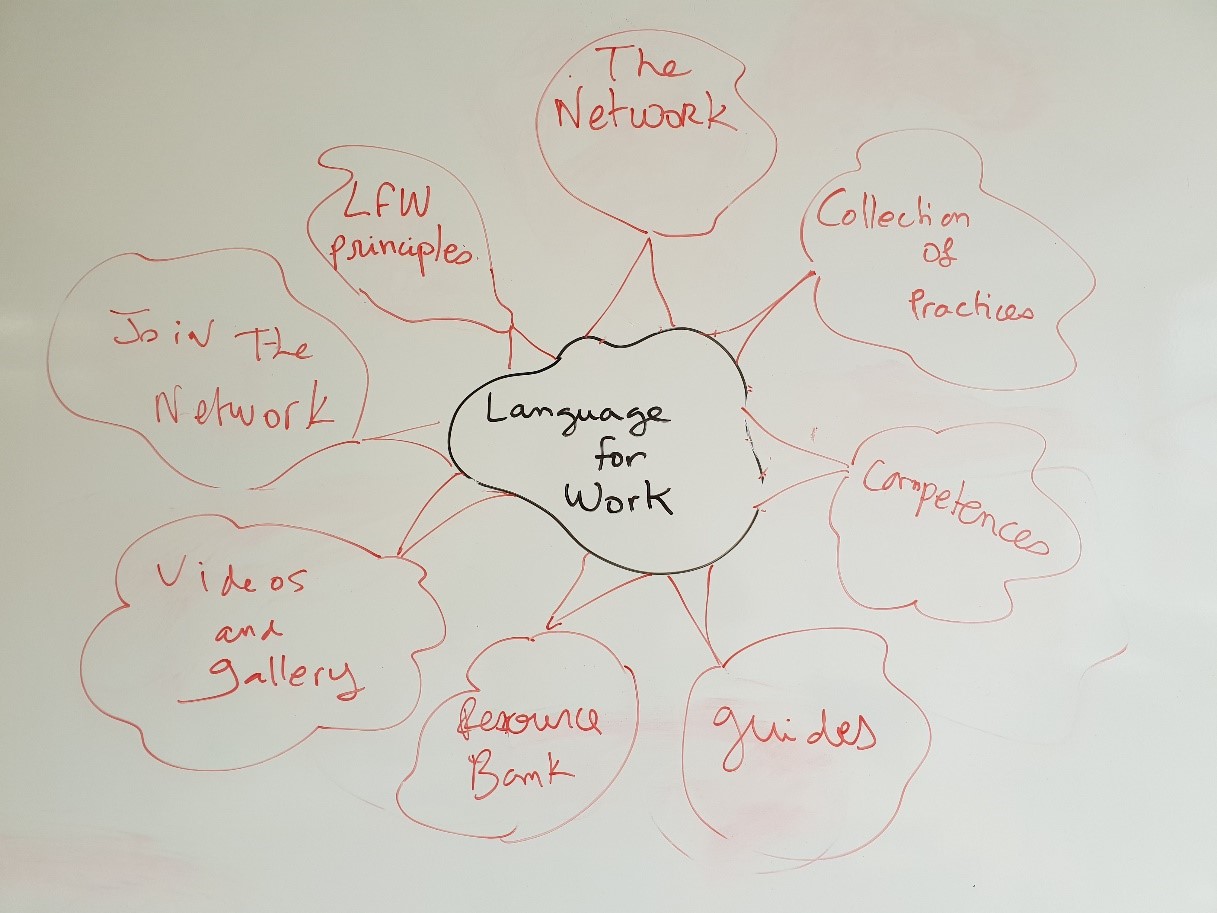
- Possibility of responding to the next call for proposals for Training and consultancy for ECML member States
On the evening of 23 January, the team presented the outputs of both LfW projects at an event in the conference series Kontext, organised by the EFSZ-Verein in cooperation with the ECML. The event was entitled "Warum nicht Deutsch dort fördern, wo es gebraucht wird? Am Arbeitsplatz!" ("Why not promote German where it is needed? At work!") and attracted some 30 participants (teachers, adult migrant training organisations, municipality, volunteers). The audience discussed the relevance to their own practice of the resources developed by the LfW projects and the network. Participants commented on the lack of training for teachers and providers of work-related L2 in Austria and agreed to request it.
Matilde Grünhage-Monetti (project coordinator), Christophe Portefin (project team member),
Frank Heyworth (consultant);
Apologized: Alex Braddell, Kerstin Sjövärd
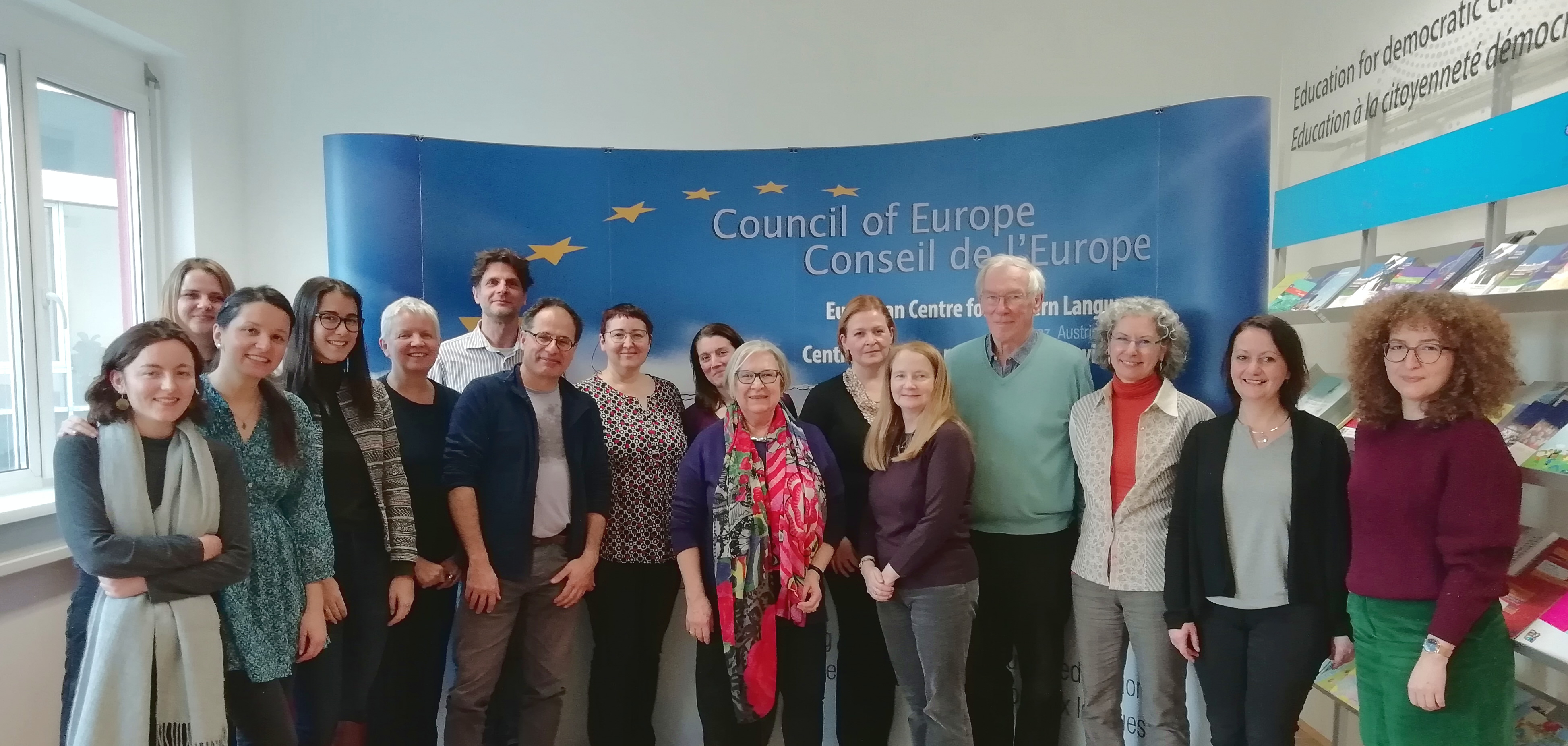
LfW project team, ECML programme consultant,
Austrian Association of the ECML, ECML staff
25.10.2018
Last ECML workshop “Language for Work – Tools for professional development” (Graz, Austria, 23-24 October 2018): fine-tuning the products of the project
The project’s final workshop (Graz, 23-24 October 2018) brought together 46 experts from 31 countries, all of whom work in the field of the linguistic integration of adult migrants and their work-related L2 development.
The event enabled participants to share issues concerning work-related L2 development in their own countries and contexts, to review the products developed throughout the project, to discuss how to make them as useful as possible and how to organise the resource bank of tools for professional development, to exchange practical applications, to reflect on engaging with strategies for managers and staff in job centres and public administration to improve communication with the public. Reflections also focused on the value of the results achieved for professional development.
***
The ECML project Language for Work – Tools for professional development (2016-2018) fosters professional development in the field of work‐related majority language learning for adult migrants and ethnic minorities. It creates tools and resources to support the professional development of teachers, teacher educators and other practitioners in this field. Language for Work – Tools for professional development uses the European learning network created by the ECML project, Language for Work – Developing migrants’ language competences at work (2012-2015).
The project aims to create four products which will be made available online via the LfW Network’s website:
- quick guide “How to help adult migrants develop work-related language skills”, currently available in 11 languages (Bulgarian, Croatian, Dutch, English, French, German, Irish, Italian, Romanian, Spanish, and Swedish);
- expandable compendium of approaches to support workplace language learning;
- framework to support professional development, outlining practitioner roles and competences relating to different approaches to support work-related language learning;
- resource bank (including training materials, case studies, etc.), linked to the professional development framework, to support professional development in the field of work-related language learning.
More information on the project website (available in English and French): https://languageforwork.ecml.at/
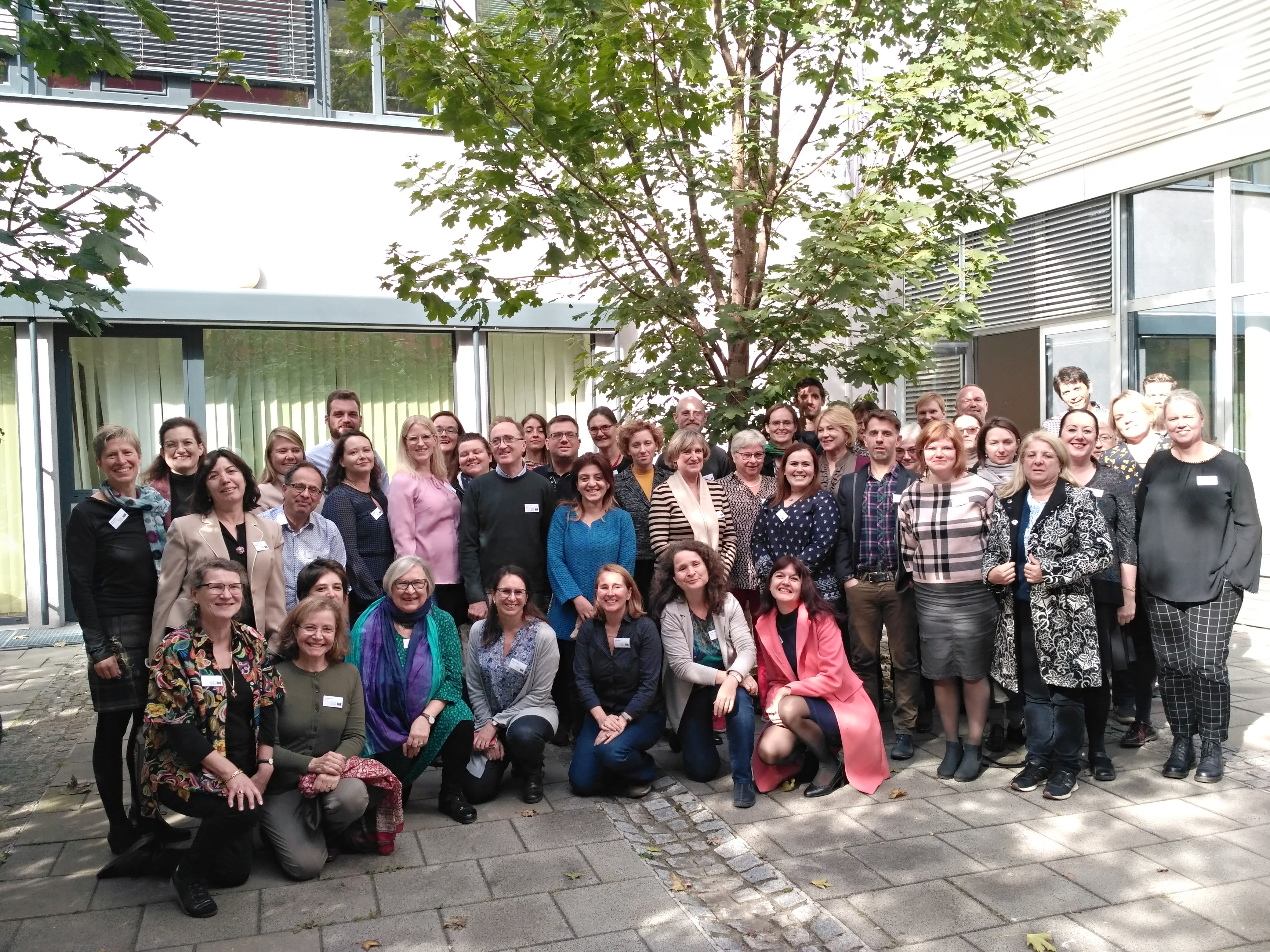
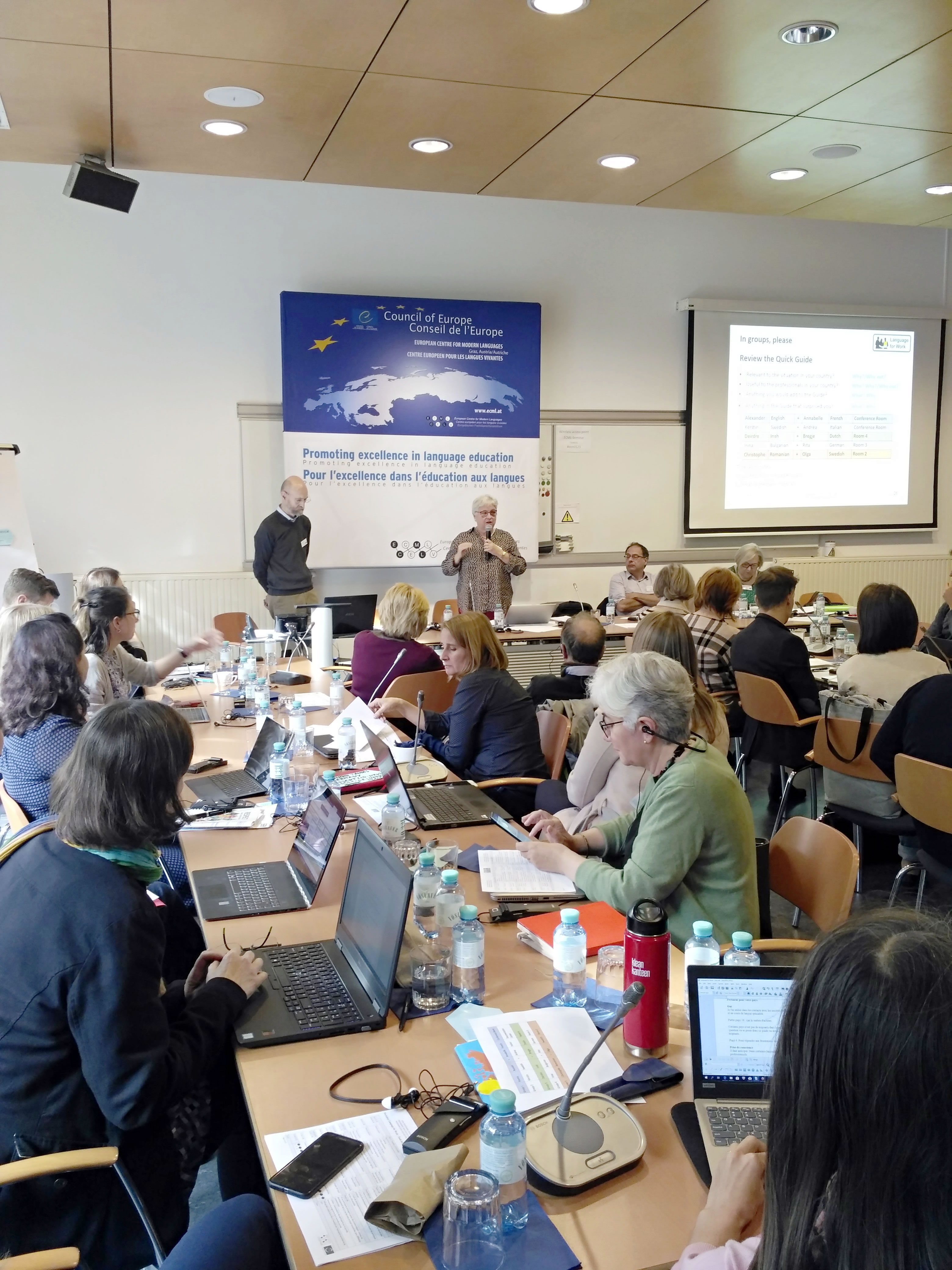
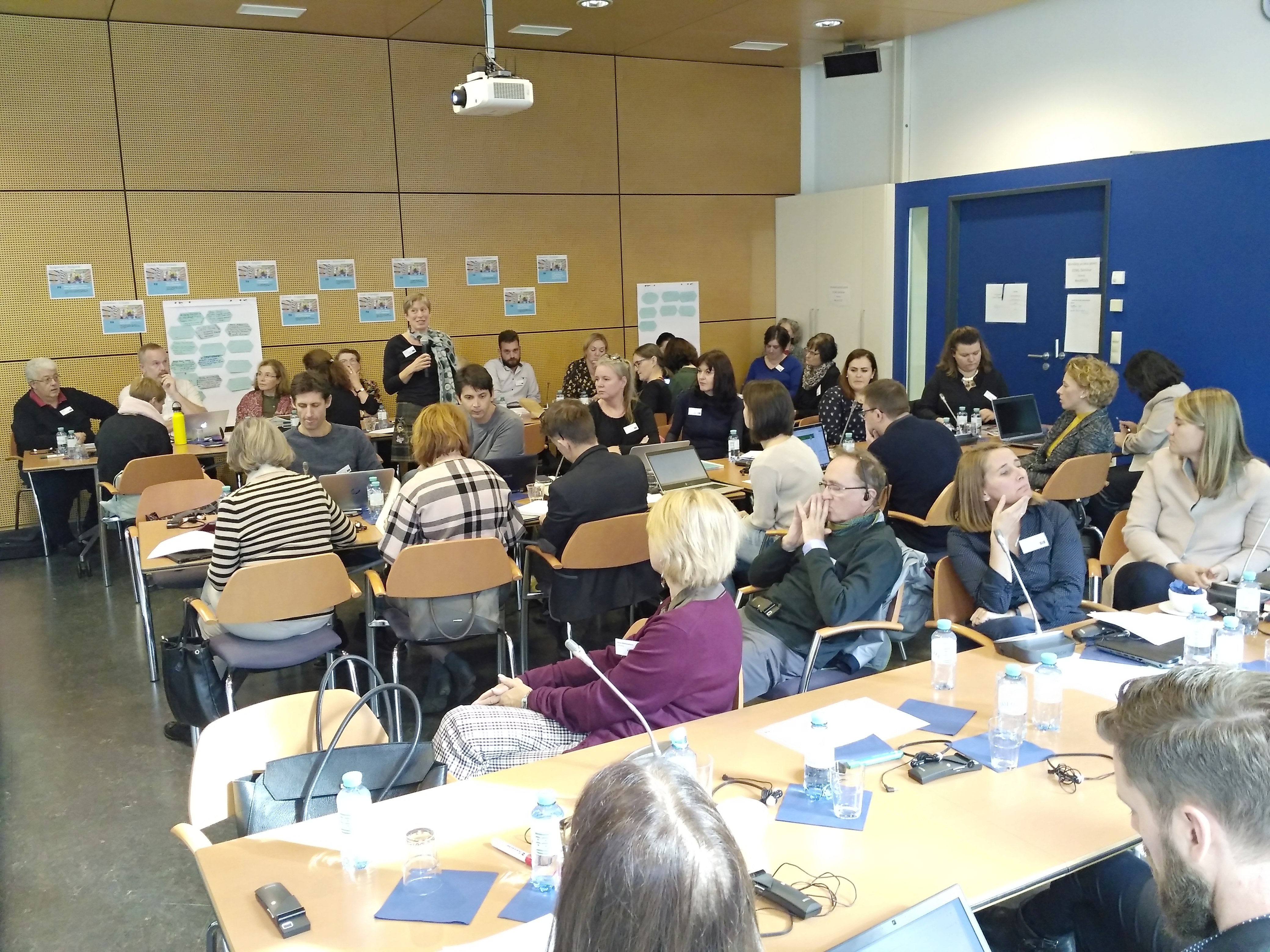
23.08.2018
"Language for work - Tools for professional development": Expert meeting report (Graz, Austria, 14-15 June 2018)
The coordinating team of the project, Language for work – Tools for professional development (LfW), held a supplementary expert meeting in stormy Graz on 14th and 15th June 2018. The meeting’s primary objectives were
1. finalising the conceptual framework of the project’s main products: the compendium of practice examples of how to support work-related language development and the inventory of practitioner competences, and
2. setting parameters for final workshop 23rd and 24th October.
A deeper analysis of the examples of practice collected at the project’s 2017 network meeting led us to fine-tune our treatment of this material.
These examples of practice will then be clustered in settings, characterised by the actors involved, and their roles. The example above could be allocated to a setting involving:
- Language teacher
- Language provider
- Coach (paid or volunteer)
- Local government
- Employer and other workplace actors ( instructor)
- Learner (job-seeking migrant/refugee)
The next step will be to describe the specific competences required by the language practitioners (in this case teacher, provider, coach) in order to cooperate successfully with the other actors and promote the L2 development of the learner.
The dissemination of the project’s products, Quick guide, compendium and inventory of competences will be at the heart of the final workshop. Interest in this event seems lively: to date, over 40 applications have been received, with almost all member states sending a representative. In addition, a number of LfW network members have applied to attend the event on a self-funding basis. We aim to design an interactive workshop, that will allow participants ample opportunity to review and discuss the project’s products in relation to work-related language development for migrants and ethnic minorities in their own various countries.
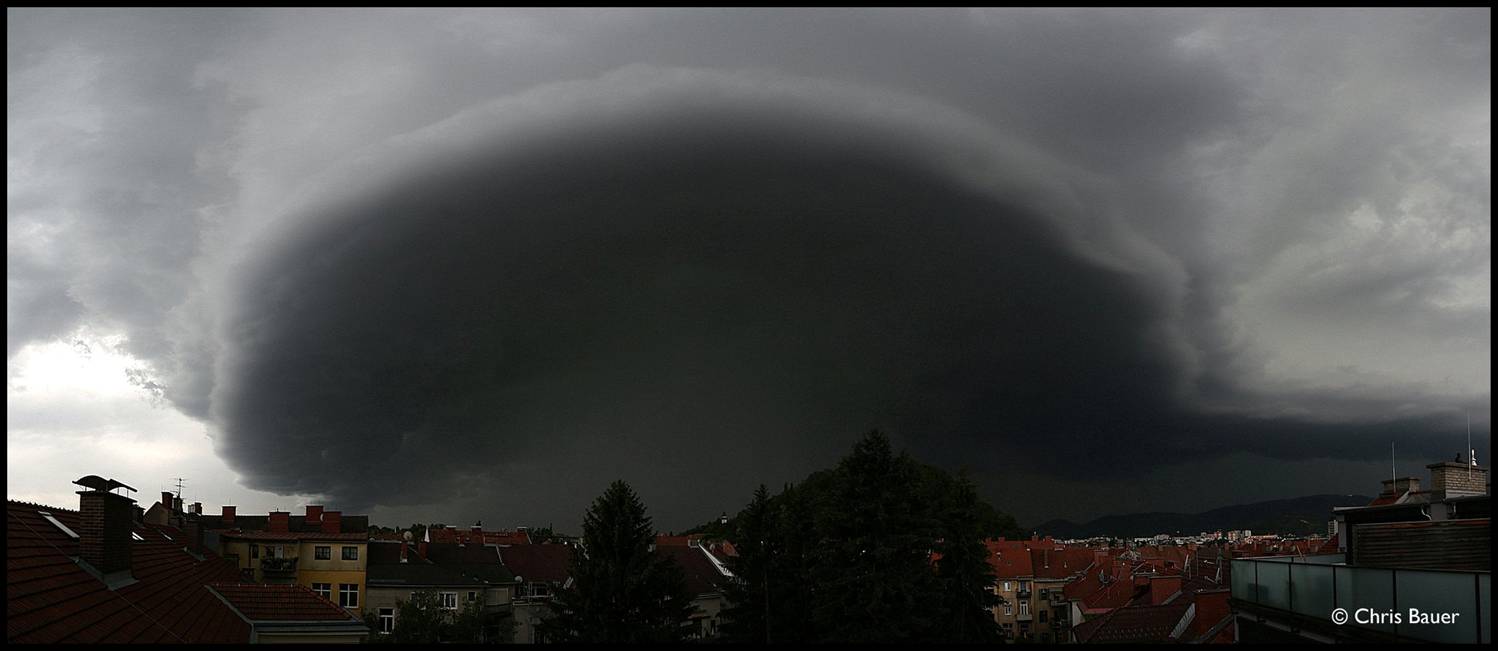
Graz before the storm on 12 June 2018
- ECML project website "Language for work - Tools for professional development" (2016-2019):
English - French
The project team:
Matilde Grünhage-Monetti (coordinator, Germany),
Alexander Braddell (United Kingdom), Christophe Portefin (France), Kerstin Sjösvärd (Sweden)
27.06.2017
Language for work – Tools for professional development: report of the network meeting (Graz, Austria, 1st and 2nd June 2017)
Support for work-related language learning is increasingly recognised as one of the keys to migrant integration and new approaches are emerging across Europe. This project creates tools to make these approaches accessible to practitioners, including
- Expandable compendium of approaches to support work-related language learning
- Professional development framework and resource bank linked to the approaches
- Quick guide to work-related language learning.
The network meeting aimed to progress the development of these tools. The meeting attracted 26 experts from 16 countries, including Canada and the Russian Federation. Prior to the meeting, participants were asked to describe ways that work-related language learning was supported in their own countries. This resulted in outlines of some 50 different approaches.
The event itself was structured as an interactive workshop. With helpful input from the project’s ECML programme consultant, Frank Heyworth, participants reviewed the outlines and considered how best to categorise the approaches; explored the concept and utility of a professional development framework to make the approaches accessible to practitioners; and reviewed and gave feedback on a draft of the quick guide to work-related language learning.
In the view of the project team, the meeting fully achieved its aims and has significantly progressed the project. Positive feedback (including the desire expressed by a number of participants to remain involved in the project) suggests participants too found value in the meeting.
One interesting issue that emerged towards the end of the event is the need for practitioners in this field to respond to new forms of economic activity, including the ‘gig economy’* and the increasing prevalence in southern Europe of migrant micro-entrepreneurs.
To echo the words (in Gaelic) of one participant, the project team would like to say, “Mo mhíle buíochas libh ar fad arís.” Heartfelt thanks to everybody who contributed to make a success of this network meeting!
*A gig economy is an environment in which temporary positions are common and organizations contract with independent workers for short-term engagements. (http://whatis.techtarget.com/definition/gig-economy)
Project flyer
LfW Network website
16.03.2016
The factor of language in guidance for employment
A few weeks after the start of the new ECML programme Languages at the heart of learning (2016-2019) the Language for Work Network’s new project – Tools for professional development started its activities with a workshop in Donostia/San Sebastian on 22nd January. The event, organised by the Association Banaiz Bagara and the Oarsoaldea Development Agency, brought together around 30 employment counsellors, language providers of Basque companies and interested individuals.
The date seemed a good omen for the workshop and the project, being the eve of the official inauguration of Donostia as culture capital of Europe, with strong reference to the idea of diversity. Diversity is an aspect – implicit and explicit – of the LfW project: diversity of languages connected to migration, diversity of contexts of work-related development, diversity of approaches disseminated by the network, etc. and the belief of benefiting from this variety of diversities.
The workshop focused on questions of particular relevance for a bilingual country facing the linguistic challenge of migrations: How to help employers identify language needs of their company? How to take into account the language needs of our bilingual society? Do migrants’ languages provide value to the local labour market? How to give workers adequate training to use the languages requested by the labor market?
In their key contributions at the beginning of the event, the LfW coordinator, Matilde Grünhage-Monetti, and the LfW member, Petra Elser, director of Banaiz Bagara, presented the project, network and website addressing the issues relevant to the audience.
This stimulated an engaged discussion among participants at the event who explored the issue of more practice-oriented and tailored-made provision, of evaluating language skills on the base of performance and not formal qualifications, and of raising awareness of the role of languages in companies (also of migrants’ languages) in the context of diversity management.
If you want to practise your Basque, read about the event on the website of Euskara plus. To check if you have understood correctly, have a look at the translation into English and if you have time, watch the video with an interview with Matilde Grünhage-Monetti (in English with Basque subtitles)
http://euskaraplus.eus/hizkuntzen-faktorea-enplegu-orientazioan-mintegi-tailerraren-ondorioak/
If you are interested in the event’s other inputs and outcomes, look for the documentation in Basque and Castillian under
http://euskaraplus.eus/wp-content/uploads/2016/02/LFW-mintegiaren-dosierra-Dosier-del-seminario-LFW-1.pdf
There is a lot of talk about plurilingualism, we practise it!
The LfW team thanks the organisers of the workshop who hosted the LfW at their own expense!
16.03.2016
First regional event of the new project, Language for Work – Tools for professional development
The first regional event of the new project, Language for Work – Tools for professional development, took place in France and involved all four members of the project team. The event was supported by the ECML and hosted by the Centre International d’Études Pédagogiques (CIEP). Thanks to cooperation with Délégation Générale à la langue française et aux langues de France, Université Sorbonne Paris Cité (Sociétés Plurielles) and the provider Accentonic, the event attracted some 80 participants involved in research, policy and practice around the learning of work-related French as second language.
The event brought together three audiences who rarely meet: practitioners (training organizations), researchers (especially in language teaching and learning) and policy makers. The first day focused on international and national networks devoted to work-related second language development. The second day was dedicated to the discussion of recent institutional developments in the country with regards to legislation on vocational education and training, basic and vocational skills and work on integration, including accounts of practice.
The LfW team opened the event: Matilde Grünhage-Monetti introduced the ECML highlighting its present focus on quality language education as key to quality education and its continuous contribution to improving language education across Europe. She illustrated the LfW rationale: the integrative potential of work for (young) adult migrants and the central role of communication and second language in present-day’s work practices. She reviewed the complexity of the field of work-related L2, sitting as it does at the crossroads of different disciplines and fields of action. Making the case for cooperation across Europe, Ms Grünhage-Monetti presented the LfW projects and network, the achievements of LfW1 and the envisaged result of LfW2. Alex Braddell then gave a brief overview of the LfW web site, explaining its functionality and role as a vehicle for communication and dissemination. Kerstin Sjösvärd presented the ArbetSam approach developed in Sweden to support workplace L2 development in the context of adult social care. This approach makes use of non-formal and informal mechanisms – areas Alex Braddell then explored in a presentation that investigated the potential of work activity itself as a vehicle for language development. This opening session closed with a presentation from the team’s other member, Christophe Portefin, on legislative developments in France and their impact on work-related language learning.
A lively discussion followed not only in plenary, but also in the breaks and at lunch. In particular issues of non-formal and informal L2 learning must be further explored in particular in view of the influx of migrants and the urgent needs to integrate them.
The LfW team profited from the contributions of and exchange with colleagues from France (including Florence Mourlhon-Dallies, team member of LfW 1) and abroad, who presented other networks (including SKiBB in Germany and Langage, Travail et Formation in France) and their reflections on research and practice in the field. The issue of liaising effectively with the various networks e.g. through a platform to achieve synergy, emerged.
The LfW team profited also from the institutional contributions regarding practice relative to the development of French as L2 in France in the context of vocational integration. Some presentations were concerned with policy changes and new legislation on vocational training and education and their implications for the language provision set up by various public bodies (Conseil Régional d’Île-de-France, Ville de Paris, Ministère de l’Intérieur). Further the results of working groups on the evaluation of competences generic to vocational contexts were presented within the European Agenda for Adult Education. Various training programmes and pilots were presented to illustrate practice, including language training programmes for female cleaners, labour market integration programmes for migrants, a programme for construction workers employed by the Bâtiment et Travaux Publics BTP (Public Buildings and Works) taking into consideration the current political changes. The cleaning sector presented its language training programme, the mastery of key cleaning competences and its adaptation to the new knowledge and skills standards (CléA) implemented in France since January 2016. Finally various supporting activities initiated by companies gave the LfW team a glimpse of encouraging social initiatives around the language in the workplace, both as part of the fight against illiteracy in the workplace (through the association Ba’ba’s work to link staff from client companies with migrant staff from supply-chain companies) and part of diversity management through a survey undertaken in the department of Hérault, in the south of France.
In conclusion, the day gave evidence of the complexity of the contexts, in which the language of the receiving country is being learnt for vocational purposes, in particular the necessity to understand learning both from a formal and an informal point of view.
Informal feedback from participants affirmed the value of the Language-for-Work network for practitioners in this field, particularly in the context of today’s urgent challenge around refugee integration.
07.03.2016
New year, new programme, new project
With the beginning of the year comes a new ECML programme Languages at the heart of learning (2016-2019) and with it a new Language for Work Project: Tools for professional development. Bridging two of the ECML’s thematic web portals, Migration and Language Education and Employment and Languages, this new project builds on the previous project Developing migrants' language competences at work.
The focus of the new project is on the professional development of practitioners involved in work‐related language learning for adult migrants including refugees and ethnic minorities, who are often facing language difficulties by the integration into the labour market. The project creates tools and resources to support teachers, teacher educators, providers and other actors in the field.
The language for work website, developed in the first project, consists of a
The website will be further developed to make tools for professional development widely available to practitioners and those involved in developing policy relevant to this area, e.g. civil servants, local authority officers, people attached to government and other development agencies, trade unions, etc. across Europe.
The coordinating team starts the year with a number of international engagements to present the project, its work and insights, including
-
Workshop with panel discussion on the role of language(s) for employment Hizkuntzen Faktorea, Enpleguaren Orientazioan/ El Factor de los Idiomas en la Orientacion al Empleo, organised by the Association Banaiz Bagaram and the Regional Agency for Development Oarsoalde Garatzen, Donostia, 22.01.2016
-
Séminaire: « Apprentissage de la langue du pays d’accueil à des fins professionnelles: un enjeu pour l’intégration », organised by La Délégation générale à la langue française et aux langues de France, Université Sorbonne Paris Cité (Sociétés Plurielles) et Accentonic, in cooperation with the Centre international d’études pédagogiques and the ECML, Sèvres 01.-02.02. 2016.
-
LIAM symposium The linguistic integration of adult migrants: lessons from research, Strasburg, 30.03-01.04.2016
Updates on these events and the learning they generate both for participants and the language for work project will be available in the course of the project.
Why don’t you become part of the international network of professionals involved in second language development for work-related purposes? All you need to do is
visit the LfW website and join . It’s free and just takes a moment.